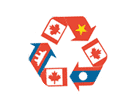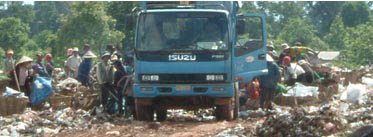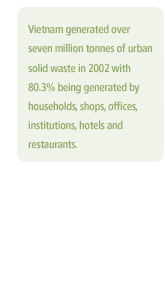



The Waste-Econ Program is a six-year collaborate program funded by the Canadian International Development Agency (CIDA). The Program is run through the Department of Geography and the Institute for Environmental Studies at the University of Toronto as well as a number of government institutions, universities, and non-governmental institutions in Vietnam, Laos and Cambodia. The aim of the project is to explore methods for recycling, exchanging and reducing wastes in a way that will be beneficial to the economies of the partner countries, the people working in the waste sector and to the environment as a whole. A number of pilot projects and training courses have been implemented with the ultimate aim of using the knowledge gained to strengthen institutional capacity, improve university curricula, and create a vibrant and economically sustainable waste economy in each of the partner countries.
Our Approach
Rather than advocating ways to dispose of waste as quickly and as cheaply as possible - the approach adopted in most developed countries until recently - the Waste-Econ program emphasizes practical methods for recycling and reducing wastes in ways that benefit the economy, the people working in the waste sector, and the environment. It also employs new ways to engage the local community in waste management decision making, such as in the siting of landfills and for promoting linkages between formal and informal players in the waste economy.
Our Goal
A traditional waste economy sector, involving complex recycling and re-use chains, exists in most developing countries. The collection of, and trade in, waste is carried out by a substantial number of impoverished people-many of them women and children-whose best chance at economic participation is reliant on recovering recyclables for resale. The Waste-Econ program aims to retain and enhance the most beneficial aspects of this traditional waste economy, while stressing sustainability, economic opportunity and empowerment.
What We Do
Waste-Econ supports a wide range of capacity-building activities in our partner countries. These include: short courses, workshops, curriculum development efforts, community outreach, partner country and Canadian graduate student training, a micro-credit program and tri-country exchanges and networks.
